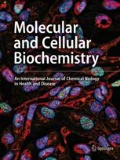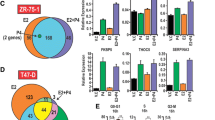Abstract
Progesterone inhibits the proliferation of normal breast epithelial cells in vivo, as well as breast cancer cells in vitro. But the biologic mechanism of this inhibition remains to be determined. We explored the possibility that an antiproliferative activity of progesterone in breast cancer cell lines is due to its ability to induce apoptosis. Since p53, bcl-2 and survivin genetically control the apoptotic process, we investigated whether or not these genes could be involved in the progesterone-induced apoptosis.
We found a maximal 90% inhibition of cell proliferation with T47-D breast cancer cells after exposure to 10 μM progesterone for 72 h. Control progesterone receptor negative MDA-231 cancer cells were unresponsive to 10 μM progesterone. The earliest sign of apoptosis is translocation of phosphatidylserine from the inner to the outer leaflet of the plasma membrane and can be monitored by the calcium-dependent binding of annexin V in conjunction with flow cytometry. After 24 h of exposure to 10 μM progesterone, cytofluorometric analysis of T47-D breast cancer cells indicated 43% were annexin V-positive and had undergone apoptosis and no cells showed signs of cellular necrosis (propidium iodide negative). After 72 h of exposure to 10 μM progesterone, 48% of the cells had undergone apoptosis and 40% were annexin V positive/propidium iodide positive indicating signs of necrosis. Control untreated cancer cells did not undergo apoptosis. Evidence proving apoptosis was also demonstrated by fragmentation of nuclear DNA into multiples of oligonucleosomal fragments.
After 24 h of exposure of T47-D cells to either 1 or 10 μM progesterone, we observed a marked down-regulation of protooncogene bcl-2 protein and mRNA levels. mRNA levels of survivin and the metastatic variant CD44 v7-v10 were also downregulated. Progesterone increased p53 mRNA levels.
These results demonstrate that progesterone at relative high physiological concentrations, but comparable to those seen in plasma during the third trimester of human pregnancy, exhibited a strong antiproliferative effect on breast cancer cells and induced apoptosis.
Similar content being viewed by others
References
Darzynkiewicz ZG et al.: Cytometry in cell necrobiology: Analysis of apoptosis and accidental cell death (necrosis) Cytometry 27: 1–20, 1997
Jacobson MD, Burne JF, Raff MC: Programmed cell death and Bcl-2 protection in the absence of a nucleus. EMBO J 13: 1899–1903, 1994
Vermes L et al.: A novel assay for apoptosis. Flow cytometric detection of phosphatidylserine expression on early apoptotic cells using fluorescein labelled Annexin V. J Immunol Meth 184: 39–51, 1995
Reed JC: Bcl-2 and the regulation of programmed cell death. J Cell Biol 124: 1–6, 1994
Chen X, Ko LJ, Jayaraman L, Prives C: p53 levels, functional domain, and DNA damage determine the extent of the apoptotic response of tumor cells. Genes & Develop 10: 2438–2451, 1996
Hockenbery DM et al.: Bcl-2 functions in an antioxidant pathway to prevent apoptosis. Cell 75: 241–251, 1993
Ambrosini G et al.: A novel anti-apoptosis gene, survivin, expressed in cancer and lymphoma. Nature Med 3: 917–921, 1997
Lu C-D et al.: Expression of a novel anti-apoptosis gene, survivin, correlated with tumor cell apoptosis and p53 accumulation in gastric carcinoma. Cancer Res 58: 1808–1812, 1998
Screaton GR et al.: Genomic structure of DNA encoding the lymphocyte homing factor CD44 reveals at least 12 alternative spliced exons. Proc Natl Acad Sci (USA) 89: 12160–12164, 1992
Sabourin JC et al.: Bcl-2 expression in normal breast tissue during menstrual cycle. Int J Cancer 59: 1–6, 1994
Gompel A et al.: Bcl-2 expression in normal endometrium during the menstrual cycle. Am J Pathol 144: 1195–1202, 1994
Gompel A et al.: Progestin effect on cell proliferation and 17β-hydroxysteroid dehydrogenase activity in normal human breast cells in culture. J Clin Endocrinol Metab 63: 1174–1180, 1986
Kandouz M et al.: Antagonism between estradiol and progestin on bcl-2 expression in breast-cancer cells. Int J Cancer 68: 120–125, 1996
Takahashi K et al.: Protein synthesis-dependent cytoplasmatic translocation of p53 protein after serum stimulation of growth-arrested MCF-7 cells. Mol Carcinog 8: 58–66, 1993
Haldar S et al.: Down-regulation of bcl-2 by p53 in breast cancer cells. Cancer Res 54: 2095–2097, 1994
Miyashita T et al.: Identification of a p53-dependent negative response element in the bcl-2 gene. Cancer Res 54: 3131–3135, 1994
Miyashita T et al.: Tumor suppressor p53 is a regulator of bcl-2 and bax gene expression in vitro and in vivo. Oncogene 9: 1799–1805, 1994
Levine AL: p53, the cellular gatekeeper for growth and division. Cell 88: 323–331, 1997
Horwitz KB, Mockers MB, Lessey BA: Variant T47-D human breast cancer cells with high progesterone-receptor levels despite estrogen and anti-estrogen resistance. Cell 28: 633–642, 1982
Alderson MR et al.: Fas ligand mediates activation-induced cell death in human T lymphocytes. J Exp Med 181: 71–77, 1995
Formby B, Stern R: Phosphorylation stabilizes alternatively spliced CD44 mRNA transcripts in breast cancer cells: Inhibition by antisense complementary to casein kinase II mRNA. Mol Cell Biochem 187: 23–31, 1998
Sherman BM, Korenman SG: Inadequate corpus luteum function: A pathophysiological interpretation of human breast cancer epidemiology. Cancer 33: 1306–1312, 1974
Cowan LD et al.: Breast cancer incidence in women with a history of progesterone deficiency. Am J Epidemiol 114: 209–217, 1981
Vignon F et al.: Antioestrogenic effect of R5020, a synthetic progestin in human breast cancer cells in culture. J Clin Endocrinol Metab 56: 1124–1130, 1984
Horwitz KB, Freidenberg GR: Growth inhibition and increase of insulin receptors in antiestrogen-resistant T47Dco human breast cancer cells by progestins: Implications for endocrine therapies. Cancer Res 45: 167–172, 1985
Chang K et al.: Influences of percutaneous administration of estradiol and progesterone on human breast epithelial cell cycle in vivo. Fertil Steril 63: 785–791, 1995
Foidart JM et al.: Estradiol and progesterone regulate the proliferation of human breast epithelial cells. Fertil Steril 69: 963–969, 1998
Barrat J, De Lignieres B, Marpeau L: Effect in vivo de l'administration locale de progesterone sur l'activitè mitotique des galactophores humains. J Gynecol Obstet Biol Reprod 19: 269–274, 1990
Jeng MH, Parker CJ, Jordan VC: Estrogenic potential of progestins in oral contraceptives to stimulate human breast cancer cell proliferation. Cancer Res 52: 6539–6546, 1992
Jordan VC et al.: The estrogenic activity of synthetic progestins used in oral contraceptives. Cancer 71: 1501–1505, 1993
Miyagawa K et al.: Medroxyprogesterone interferes with ovarian steroid protection against coronary vasospasm. Nature Med 3: 324–327, 1997
Martin SJ et al.: Early redistribution of plasma membrane phosphatidylserine is a general feature of apoptosis regardless of the initiating stimulus: Inhibition by overexpression of bcl-2 and abl. J Exp Med 182: 1545–1556, 1995
Bu SZ et al.: Progesterone induces apoptosis and up-regulation of p53 expression in human ovarian carcinoma cell lines. Cancer 79: 1944–1950, 1997
Lee WY, Jin YT, Tzeng CC: Reciprocal expression of bcl-2 and p53 in breast ductal carcinoma. Anticancer Res 16: 3007–3012, 1996
Lida N, Bourguignon L: New CD44 splice variants associated with human breast cancer. J Cell Physiol 162: 127–133, 1995
Owen GI et al.: Progesterone regulates transcription of the p21WAF1 cyclin-dependent kinase inhibitor gene through Sp1 and CBP/p300. J Biol Chem 273: 10696–10701, 1998
Kandouz M et al.: Proapoptotic effects of antiestrogens, progestins and androgen in breast cancer cells. J Steroid Biochem Mol Biol 69: 463–471, 1999
Author information
Authors and Affiliations
Rights and permissions
About this article
Cite this article
Formby, B., Wiley, T. Bcl-2, survivin and variant CD44 v7-v10 are downregulated and p53 is upregulated in breast cancer cells by progesterone: Inhibition of cell growth and induction of apoptosis. Mol Cell Biochem 202, 53–61 (1999). https://doi.org/10.1023/A:1007081021483
Issue Date:
DOI: https://doi.org/10.1023/A:1007081021483




